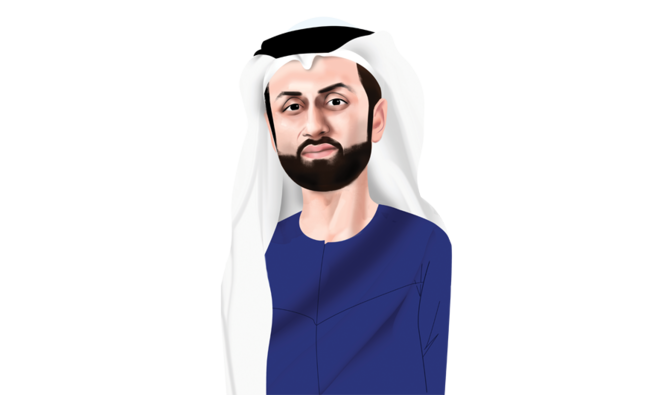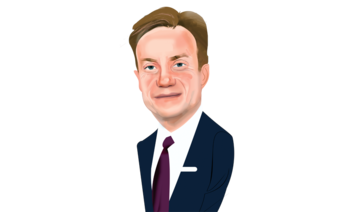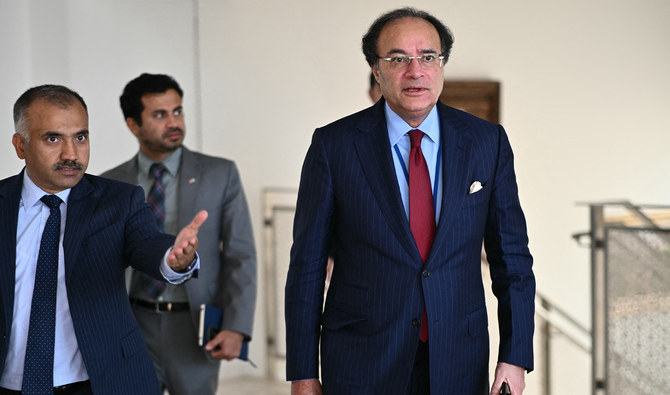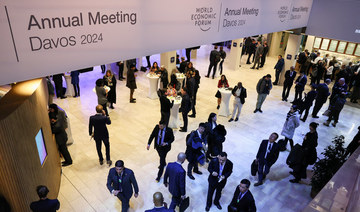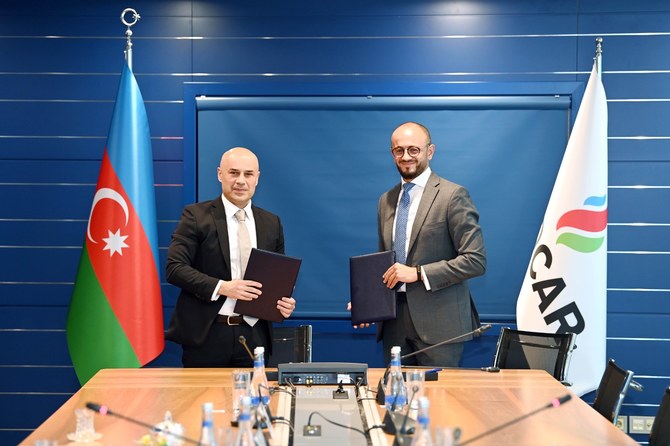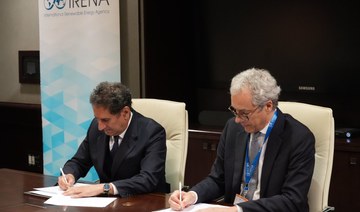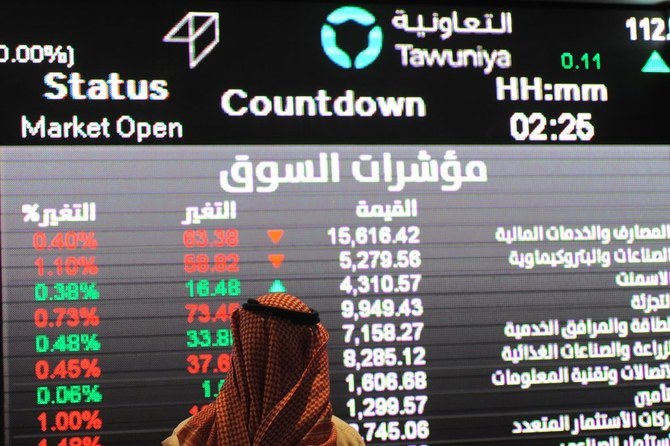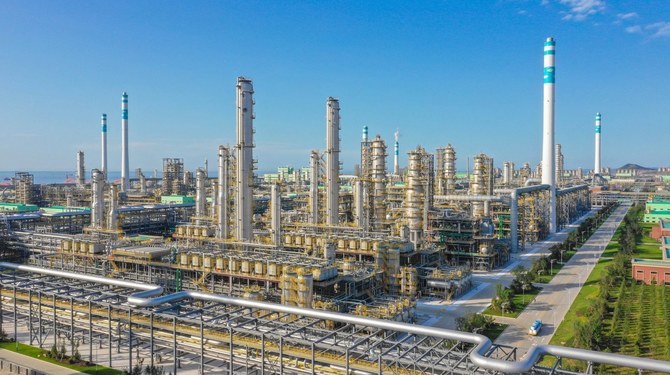In the strong family business circles of the Middle East, the question of succession is often a fraught one.
DAMAC Properties, the real estate developer founded and run for nearly two decades by Hussain Sajwani, seems to have plenty of options in the matter.
His four children all play a role in DAMAC, but Ali — the 28-year-old eldest son — looks to be the heir apparent for the billion-dollar-plus group, one of the UAE’s leading property groups.
“I and my siblings have been trained at DAMAC since we were very young,” Ali told Arab News. “When I was only 12 or 13, I was reading balance sheets and running a ‘ghost’ portfolio in the summer holidays. It was the training that has helped me the most.”
He is currently general manager of operations at DAMAC, but has a strategic overview of the UAE and international businesses, as well as responsibility for the digital initiatives that the company regards as essential to keep it growing.
So his take on the UAE’s problematic real estate sector is especially relevant. The Dubai property market is the core of the DAMAC business, with the company’s name synonymous for many years with the “iconic lifestyle developments” that the emirate has made its trademark.
Prices have been falling for several years as the glittering launches have continued despite falling demand, fueling worries of a broader malaise in the economy.
Some economic experts have expressed concerns about the build-up of debt in the Dubai economy, and the effect on the banking system of high exposures to falling real estate values.
“I think we’re at the bottom now in Dubai, and we’ll see some slight improvement with Expo 2020,” Ali said. “The hotel and retail sector will do well out of Expo, and there should be a big inflow of tourists. Hopefully some of them will decide to stay, and that could help drive property prices higher.”
Partly in response to the real estate downturn, Dubai’s government has introduced a package of incentives to encourage foreign investment in the sector, including longer-term residence visas and the scrapping of some property charges.
“But there’s no need to beat about the bush — demand is weak, not like it used to be. And there’s too much supply. I studied economics at university, and it’s all about supply and demand,” Ali said.
The “key catalyst” toward an improvement in the market would be to limit the amount of new developments, and he sees some cause for optimism in the new Higher Real Estate Committee formed last year to regulate new developments and launches.
“That’s good news,” he said, adding that he had already detected a slowing in the rate of new launches by the government-controlled property sector that the committee oversees.
Nonetheless, Ali said there were some fundamental challenges to the UAE’s property market that resulted from changing demographics.
“There are cyclical changes. We see it in our core clientele. When the retail sector and food and beverage are down, it leads to layoffs and departures, and it affects hotel occupancies,” he added.
“In a place like the Dubai International Financial Centre, you can see it. There are more restaurants, but the core clientele has changed. They don’t have the same spending power when they’re walking around the malls with a backpack and a banana.”
But conversely, there are still opportunities for real estate developers to cater for the new mid-market segment, he said.
BIO
BORN: June 1991, Dubai
EDUCATION: Economics, North Eastern University, Boston, US
CAREER
- Entrepreneurial activities in UAE — transport, logistics, hospitality
- General manager of operations, DAMAC Properties
Overall, despite the challenges that led DAMAC to recently declare its first full-year loss in a decade, Ali believes that the fundamentals of the Dubai market — such as infrastructure, connectivity and security — are strong and will once more make it a magnet for regional real estate investment.
DAMAC was famed for many years for its glittering launches of new developments, with high-profile events, extravagant incentives and all-encompassing media campaigns aimed at selling the luxury projects.
Those techniques have changed in the digital era, and a large area of Ali’s current responsibilities consists of putting in place the right digital marketing strategy to enable DAMAC to exploit the new environment. International consultants have been hired to get the digital strategy right.
“It’s all about lead generation — how to target the right person at the least cost. We’re told that data is the new gold, but we have to be able to utilize it properly. That’s where the future lies,” he said.
DAMAC has created a “data lake” of information about existing and potential customers, with new data added daily to the marketing mix.
But if the domestic market is challenging, there are plenty of opportunities elsewhere in the world, he said. One is Saudi Arabia.
“Over the next five years, under (Crown Prince) Mohammed bin Salman, it has all the right ingredients — a visionary leader pushing the country and opening it up to foreign investors,” Ali said.
DAMAC is already familiar with the Saudi market, not least because of the large numbers of citizens from the Kingdom who buy its properties in Dubai and use its serviced apartments and other facilities on trips to the UAE.
While he expects that to slow to some degree as leisure opportunities increase at home, he sees the potential to add to existing developments in Riyadh and Jeddah.
“We’re speaking to people all the time in Saudi Arabia — developers, the authorities and landowners. We’re actively exploring that market and visit there regularly,” he said.
In Europe, London will continue to be the focus of DAMAC’s expansion. A big development at Nine Elms, south of the River Thames, was topped out last year and is already around 60 percent sold.
Undeterred by Brexit and new planning restrictions in some of the more upmarket parts of the British capital, Ali is looking at other new developments in central London.
“With Brexit, the biggest thing was the uncertainty. Now it’s done and over, thank you very much. Regardless of Brexit, London is London, the capital of the world,” Ali said. European “gateway cities” such as Paris and Berlin are also under consideration.
Other international markets have also attracted DAMAC’s interest. The group is currently developing three lagoons on the Maldives, and is in negotiations with a “world-class operator” to manage the 100 or so luxury villas that are being built there.
Also in the Indian Ocean, a preliminary design has been agreed for an island development on the Seychelles.
“We see good growth from the high-end resort business,” said Ali, declining to comment on other potential developments, for example in Bali. “That’s not confirmed.”
There are big projects in Oman and Beirut, though he acknowledged that the economic situation in Lebanon “isn’t the best.”
Then there is the US. DAMAC, as the only operator of Trump Organization golf courses in the UAE, has good relations at the highest level in America, and both Hussain and Ali have been photographed socializing with the US president. But that does not necessarily mean that a DAMAC project in the US is imminent.
“The US is a long way away, and logistically that creates bottlenecks. You need the right opportunities, and also have to ask what do we bring to the table,” Ali said, also raising concerns about high state and federal taxes.
But the group will soon announce a joint venture in the Canadian market in Toronto, its first venture into North American real estate, which could be an indicator of increasing trans-Atlantic interest.
Outside DAMAC, when not relaxing by driving fast cars or sea diving, Ali has got involved in the UAE startup scene with a series of small businesses in transportation, facilities management and hospitality.
“I wanted to prove I could do something outside the group. DAMAC is entrepreneurial at the top, but there’s also a corporate ambiance. I wanted to achieve something outside the corporate environment,” he said.
“But now I’m much more focused on DAMAC. It is fulltime, because as a family business we never really stop working,” he added.
“We have dinner in the evening together and discuss business. At weekends we get together and talk about work. We’ve agreed in the past not to talk business around the dinner table, but then there were long silences. That’s the way it has been since we were kids.”



